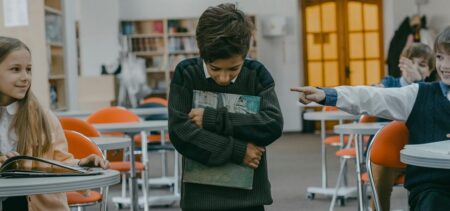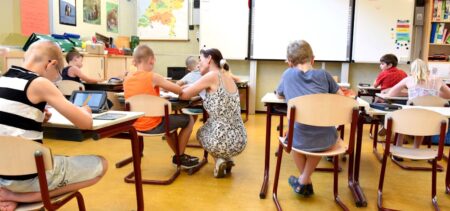In the midst of summer holiday, (or any other holiday, by that matter), when children may find it challenging to occupy their free time, parents and educators face an everlasting dilemma: is boredom educationally beneficial or not?
As it turns out, what we usually perceive as unoccupied leisure time from an outside perspective can actually represent a sum of important inner restructuring moments in terms of brain development, emotional intelligence building and psychological health and well-being.
Researchers identified the existence of two main attention systems in humans, one of them being directed inwards. This focuses on daydreaming, planning, re-playing memories and generally drifting away on a suite of imaginary mental images. (The source article mentioned above investigates the way digital activities threaten this inward-oriented attention and the yet unknown effects of this phenomenon upon humans – a thing also important to remember for those who take care of youngsters).
The value of mind wandering is extremely important, especially in developing individuality, in supporting creativity and stimulating original, innovative thought – as proven by research.
Try telling that to the people that, in their quality of parents, tutors, mentors or educators, have covered all the challenges of taking care of children by carefully planning and actively following through every second of every moment – and one may meet vigorous denial of the idea that boredom is actually good for kids.
Of course, especially when having to manage more children at once, scheduling and assigning tasks to keep them occupied is the simpler solution. Otherwise, chaos may ensue in a blink of an eye. Nevertheless, there is another crucial lesson here: accepting and pleasantly spending unassigned time, dealing with nothing-to-do and emerging calmer, better persons is an important skill to have in life later on.
Generations’ clash?
If it weren’t backed up by science, the idea that mind wandering is actually fruitful could easily be blamed upon the different generations interacting and positioning themselves on different sides of the digital boom.
Still, this remains real and palpable: teachers and parents who grew up without technology to actively fill each free moment remember their childhood as a time of outside games, live interactions with their peers, reading, getting bored, daydreaming and watching TV. On the other side, children now log into a device as soon as they feel the slightest sign of boredom – and they can play for hours at a time. When adults try to intervene, the young ones’ reply is usually that this is their free time, and that without technology they are bored. Game closed – either the adults organize different activities, either children immerse themselves into technology, where available.
This leaves out genuinely free time, un-assigned, time without a pre-planned purpose, inward attention time, time to contemplate their inner selves. Is this “boredom time” a thing of the past, or is it vital for the adults of tomorrow?
We browsed a nice article dealing with the power of boredom that comes from a mother of four. Four boys. Therefore her case for allowing and encouraging boredom is a pretty strong one – for all parents know the hardships of raising one kid, never mind four boys. A nugget of wisdom from this article talks about “setting the example: stashing away that phone and going for a walk, putting out a blanket in the backyard to stare at the stars, searching for four-leaf clovers in a nearby field.”
Be it a clash of generations or not, it is more important to educate for the better and minimize the risks – what if genuine free time is actually very important? Eliminating it completely from the modern childhood would represent too much of a hazard. Who can vouch for the adults of tomorrow and their mental health?
Boredom as a warning sign
Sometimes, when emerging in an organized context, the boredom state or reaction is a red flag for various problems. Either the outside stimuli are wrong or wrongly organized, either the inside landscape of individuals presents peculiarities.
From this angle, an interesting material approaches the status of boredom in ADHD students, from beating it to embracing it and teaching the affected people to recognize and harness the power of weariness. Again, the author strongly questions the educational approach of completely eliminating unoccupied time from the students’ schedule: “so without understanding the nature and power of boredom we raise another generation that doesn’t understand its own interests, doesn’t develop their productive passions”.
Boredom as an educational goal in itself – here’s an important takeaway. Although it may well raise another questions, keeping this in mind when structuring learning programs could ensure that extra touch that favors creativity.
Boredom and creativity
HBR introduced in one of their articles another related research paper coming from the University of Lancashire. It all has to do with the creativity-booster effects of unfocused time, and it applies to adults, as well as to younger students. By practical testing performed on groups of subjects, the researchers proved that the state of being bored actually increases the creativity in people. Feeling passive and uninterested in any particular activity just before receiving a certain task determined the subjects to come up with better, more innovative ideas.
The same article juxtaposes the results of a Penn State University research that demonstrated boredom’s effects on convergent thinking, as opposed to the above-mentioned tests that explored divergent creative thinking. Again, the participants alleviated their boredom by enhancing their capabilities in fulfilling their tasks.
Just as a warning, boredom needs some of a guidance, too. Huffington Post suggests this by introducing various ways of harnessing it. It is easily to see why grabbing the smartphone or other device, indulging in destructive or toxic activities or getting overly bored would be wrong. Again the possibility of going the wrong way during such moments reminds us of the importance of learning how to deal with mind wandering from an early age. Understand its value, enjoy it – yes, but never let it take us to negative behaviors.
Creativity needs a relaxed mind, it flourishes from healthy breaks and time spent with ourselves. If our brain were a machine, unstructured time would represent its maintenance moments.
Consider the children’s best interest
When it comes to children’s free, unstructured time, sometimes adults confuse practical necessities with what is actually the best for the young ones. When due to circumstances it is not an option for the child to spent unstructured time at home or in the park during his/hers early years or later during holidays, parents enroll their kids into all sorts of activities. This is an answer to the question of who will supervise the children for an affordable fee, not necessarily the best answer for the children.
Since other people specialized in providing supervision and various activities for the kids whose parents are busy, this type of occupation turned into a business. These businesses advertise their services and thrive on being trendy to enroll your children into as many activities as possible. As a parent, or even as a teacher, it is better to try maintaining a balance and recommending only the optimal activities.
Being selective is better, as is having the little ones’ best interest in mind. Which, as we have seen, includes unstructured time, as well as family time, quality time with siblings and relatives and, of course, plenty of time to rest, serve the meals and just feel relaxed, comfortable and generally happy.




































